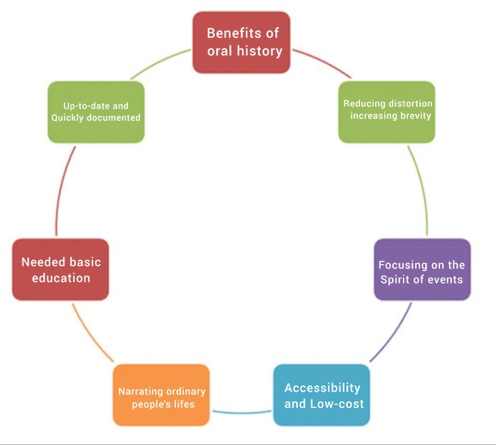Benefits of Oral History
Written by Mahya Hafezi
Translated by Kianoush Borzouei
2024-12-23
The Oral History website, aiming to delve deeper into the challenges and details of producing oral history works or memoirs, has conducted interviews with experts and practitioners in this field. These interviews are presented to the audience as brief commentaries.
History, as one of the fundamental disciplines within the humanities, has evolved through time to adopt various forms and methodologies. Concepts such as "written history," "comprehensive history," and "oral history" exemplify these approaches. Written history relies on documents and textual sources for the analysis and composition of historical accounts, while comprehensive history seeks to integrate various sources—both written and oral. Among these, oral history, which has recently garnered significant attention, is rooted in the collection of verbal accounts, interviews, and testimonies. This approach not only complements written history but also opens new prospects for historical research.
One of the most prominent advantages of oral history lies in its immediacy and contemporaneity. Unlike written history, which is often composed years after the events and delayed by the release of documents, oral history enables the immediate documentation and preservation of occurrences. This attribute allows the current generation to learn lessons from history in real time, rather than it being merely a resource for future generations.
Another significant merit of oral history is its capacity to clarify events and reduce the risk of historical distortion. Written history, primarily authored by a select group of historians long after the events have transpired, is susceptible to alteration or bias. Conversely, oral history provides the opportunity to record narratives directly from individuals who witnessed or were involved in the events themselves. This is particularly crucial when written sources are scarce or influenced by specific agendas. Oral history amplifies the voices of those often marginalized in formal historiography, offering a more inclusive and accurate portrayal of the past.
Oral history also excels in capturing details rarely found in written accounts. While written history typically focuses on overarching themes and tends to overlook the essence of events, oral history breathes life into occurrences by delving into their nuances, making them more tangible. For instance, in the case of a car accident, a police diagram may represent the written account, whereas the eyewitness testimonies unveil the incident's emotional and contextual subtleties. These details provide a profound dimension to our understanding of history, which is rarely uncovered in official records. Oral history addresses not only the "what" of events but also explores the "why" and "how," explaining the emotional and social contexts surrounding them.
Accessibility and cost-effectiveness represent additional benefits of oral history. Unlike written history, which often necessitates access to official, and sometimes restricted, documents, oral history facilitates direct dialogue with individuals present at the events. This feature enables researchers to easily gather information from witnesses without the need for elaborate and costly processes.
Oral history also distinguishes itself through its audience. Unlike written history, which predominantly recounts the lives of rulers and prominent figures, oral history narrates the experiences of ordinary individuals. By democratizing historical accounts, it extends the scope of documentation beyond elites, granting everyday people a place in the annals of history. For this reason, oral history can be suitably termed as "the people's history," presenting a mosaic of diverse and multifaceted perspectives.
On the other hand, the rapid expansion of digital media has led to an unprecedented acceleration in the circulation and production of data, posing certain challenges for oral history. While oral history’s simplicity and accessibility provide distinct advantages over written history, some incorrectly believe it requires no formal training. However, this assumption is misguided. Oral history necessitates foundational education, with practitioners gradually acquiring the required skills through experience. In contrast, producing credible written history demands years of academic study, research, and diligence. The lack of adequate training in "media literacy" can result in the dissemination of inaccurate information. To address this issue, it is vital for educational, cultural, and social systems to equip individuals with the ability to detect accurate content from misinformation, thereby ensuring the proper utilization of data.
In summary, oral history, as a novel methodology alongside written history, not only facilitates the documentation of details and events from diverse perspectives but also offers opportunities for reflection, awareness, and critical analysis of contemporary events. However, to harness the potential of this approach effectively, supervision and educational frameworks are required to guarantee the accuracy and reliability of oral narratives.

Number of Visits: 1204








The latest
Most visited
A Statistical Glance at the Oral History Archive of Iran
The Oral History Weekly, an electronic periodical that commenced its regular publication in November 2010, now stands on the threshold of releasing its 700th issue. Published every Wednesday, the newsletter consolidates all content posted on the Oral History website over the preceding week and circulates it to more than 850 subscribers via email. This report—drawing upon statistical data from content published on ...A Memory of an Army Aviation Pilot
I was taking a nap in my office when the door opened and a soldier entered the room. I got up from my chair and after arranging my clothes, I prepared to hear the soldier's news. After saluting, he said, "Captain, the commander has business with you." And with this, he paid military respect and left the room.Monafeghin: A New Deception
July-August 1989Following the discussions around the asylum of Iraqi prisoners of war in Iran during peace negotiations, the Iraqi side, not wanting to fall behind, launched their own campaign to offer asylum. At the outset, they attempted to attract prisoners by making grand promises ...
Supports from Guilds and Bazaars peaple
Memoirs of Haj Hossein FathiOur base of operations had become the Saheb al-Zaman Mosque in the Kamp-Lou neighborhood of Ahvaz. With the assistance of Brother Khani and his companions, we began preparing hot meals and sending them to the frontlines. We ourselves, along with several fellow merchants from the bazaar, entered the conflict zone, bringing warm clothing, ...


